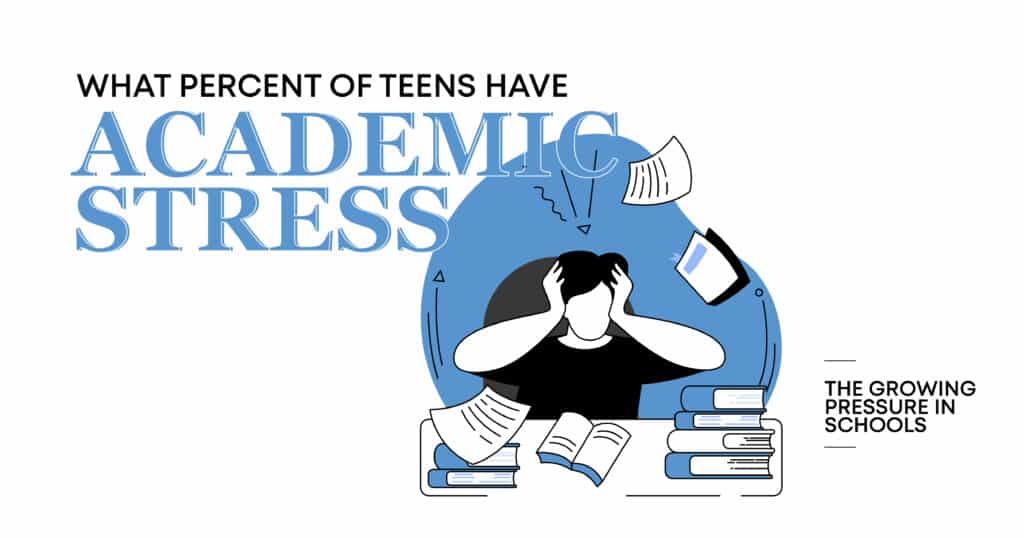The stress that students experience in their academic work has emerged as a widespread issue in our current achievement-driven society. Students now face more responsibilities than simply completing their assignments and earning good grades. The combination of rising academic responsibilities and intense competition for college entry has created an environment where more and more teens experience pressure.
What percentage of teenagers experience school-related stress? The number of students experiencing academic stress has increased compared to earlier generations. We need to examine the available statistics to understand the current state of academic pressure.
The Numbers Behind the Rise in School-Related Stress
Recent studies show that academic responsibilities cause stress in about 70% of teenagers. The academic expectations from past decades were substantially lower than the current statistics show. The rising numbers of teens experiencing academic stress since past decades demonstrate how society now places greater importance on academic achievement and test results and future career prospects.
The American Psychological Association has documented school-related stress statistics at dangerous levels because teen anxiety reached unprecedented heights. The 2023 survey showed that academic excellence pressure overwhelms 60% of teens who experience insomnia and anxiety and have poor concentration because of their school-related concerns.
The statistical data demonstrates that academic stress has become a critical issue which affects young people today. Students face pressure from multiple directions because society and parents along with social media create an environment of constant comparison.
Why Academic Pressure Is Increasing Among Teens
What factors contribute to the growing academic pressure that students experience? The expectations placed on contemporary teenagers have surpassed those of their predecessors. The pressure that high school students experience today exceeds what previous generations had to deal with. Several major factors drive the rising academic pressure, which we need to examine.
- College Admissions Competition. As college acceptance rates decline, teens need to stand out more than ever. With more focus on standardized test scores, extracurriculars, and academic performance, teens are under constant pressure to outperform their peers.
- Social Media Influence. The daily experience of social comparison for teens emerges from their use of Instagram and TikTok platforms. The need to match others’ standards, particularly regarding academic success and achievements, intensifies academic stress.
- Standardized Testing. Standardized testing remains essential for students because it includes exams like the SAT or ACT. The tests used for college admissions create anxiety about scores among teens, which leads to increased overall stress levels.
- Parental Expectations. Many parents want their children to be successful in their studies and have a promising future. Although these desires are positive, they may also contribute to teens’ high academic stress.
- The Rise in Academic Workload. The current educational program has never been more demanding than it is at present. Students who face academic pressure from heavy assignments multiple AP classes, and performance expectations often feel they cannot manage the expectations.
Common Causes of Stress in High School Students
High school students experience a high degree of stress because multiple factors combine to create this stress. The main causes of stress in high school students stem from academic requirements and social expectations, as well as emotional challenges. The following list includes the primary stress factors which lead to high school stress:
Heavy Workload and Deadlines
Academic stress is primarily caused by the rising number of homework assignments together with group projects and due dates. Students experience overwhelming stress because of their heavy workload, which becomes worse when they participate in school clubs or work part-time.
The Pressure to Perform Perfectly
A rising educational trend in schools links academic performance directly to personal value. Students frequently believe they need to earn straight A’s because anything less will result in failure labels that create persistent grade-related anxiety.
Balancing Extracurricular Activities
Extracurricular activities deliver important learning opportunities, yet they increase the level of responsibility. The combination of sports activities, club membership, and volunteer work creates a challenging situation for teenagers who must manage their responsibilities with academic responsibilities.
Family Expectations and Comparisons
Academic stress results from parental pressures, which frequently originate from cultural expectations and the need for children to enroll in elite colleges. Students frequently believe they must fulfill or surpass parental expectations and experience inadequacy when they fail to meet these standards.
Social Media and Peer Pressure
Social media operates as a pressure cooker rather than simply being a distraction for users. Teenagers frequently find themselves in comparison situations when they evaluate their academic progress and their online presentation of success. Students must spend extra time monitoring themselves, which generates more stress that worsens their academic performance.
How School Stress Impacts Teen Mental Health
School-related stress produces effects beyond the feeling of being overwhelmed, which students experience during examination periods. When left untreated, academic stress produces enduring negative impacts on teenage mental health, which become permanent if professionals fail to intervene at an early stage. Here’s how:
Increased Anxiety
When teens spend more time worrying about their grades, they increase their chances of developing anxiety. The anxiety experienced by students manifests in two ways: academic test anxiety and social anxiety from peer and parental judgments. The combination of academic and social pressures in high school produces psychological and physical symptoms, which include:
- Panic attacks
- Insomnia
- Shortness of breath
- Digestive issues
Depression and Emotional Distress
Students who experience chronic academic stress often become helpless and depressed. The pressure to meet academic standards creates depression in one out of five teenagers who face this challenge. The constant feeling of inadequacy creates major damage to their emotional state.
Burnout
Students who overexert themselves may develop burnout, which produces physical and emotional exhaustion. The condition shows itself through decreased motivation, social withdrawal, and poor academic results.
Poor Self-Esteem
The inability of teens to meet academic expectations leads to negative impacts on their self-esteem. Students develop a sense of self-worth that depends on their grades yet experience declining self-confidence when they fail to meet their academic targets.
The Link Between Academic Expectations and Teen Anxiety
The connection between academic expectations and teen anxiety exists without doubt. Higher academic expectations increase the chances of anxiety development among teenagers. Students experience a strong drive to excel academically, yet this academic pressure frequently creates deep feelings of insufficient performance.
Students experience nonstop anxiety about fulfilling expectations from teachers, parents, and peers, which sets off multiple stress-related symptoms that prevent them from focusing, studying, and building meaningful relationships. Students experience persistent high school stress that continues beyond graduation because they fear academic failure.
Coping Strategies That Help Teens
The pressure exists, but teens can manage their academic stress effectively. The appropriate coping strategies help students deal with school-life pressures while protecting their mental health.
Time Management and Organization
Time management skills provide essential benefits to teenagers, who should learn to create to-do lists, prioritize tasks, and divide assignments into smaller parts. This approach helps students tackle their work effectively without excessive effort.
Stress-Relief Activities
Regular physical activity, including exercise, yoga, or meditation, can help reduce the symptoms of stress. Encourage teens to find stress-relief activities that work for them. Taking a walk or listening to music can be simple ways for them to unwind after a stressful day.
Open Communication
Encourage teens to talk openly about their stress. Verbalizing their feelings, whether with a parent, counselor, or friend, can provide relief and offer clarity. Teens must know they aren’t alone in their struggles.
Realistic Expectations
One of the most effective ways to reduce academic stress is to set realistic expectations. Teens should be reminded that a perfect GPA doesn’t define success. Parents and educators must acknowledge effort, resilience, and growth as much as results.
Seeking Professional Help
For teens overwhelmed by stress, seeking professional help can be a game-changer. Therapy and counseling can help teens develop coping skills, manage anxiety, and build healthier relationships with school.
How Parents and Educators Can Create a Healthier Environment
It’s not just about the teens. It’s about the adults in their lives, too. Parents and educators play a critical role in creating an environment where teens feel supported rather than overwhelmed. Here are a few ways they can help:
| Foster a Growth Mindset | Encourage teens to view challenges as opportunities to learn and grow rather than threats to their self-worth. Praise effort, perseverance, and the process rather than just focusing on the outcome. |
| Manage Expectations | Ensure that academic expectations are realistic. While it’s important to push teens to do their best, it’s equally important to understand that perfection isn’t attainable, and that’s okay. |
| Be Supportive, Not Controlling | Offer emotional support rather than micromanaging every aspect of a teen’s life. Allow them the autonomy to manage their responsibilities while knowing you’re there to guide and help when needed. |
Need Support Navigating School Stress? Hillside Horizon for Teens Is Here to Help
If your teen is struggling with the pressures of school, we’re here to help. At Hillside Horizon for Teens, we offer personalized support to help teens cope with academic stress and build a healthier relationship with their education. Our experienced counselors provide strategies that help reduce anxiety, increase emotional resilience, and improve overall well-being.
Don’t wait until the stress becomes unmanageable. Contact us today to learn how we can support your teen’s mental health and academic journey.
FAQs
How many teenagers experience academic stress?
Nearly 70% of teens experience academic stress, according to recent studies. This includes everything from homework and exams to the pressure to perform in extracurriculars.
What are the causes of stress in high school students?
Some common causes include heavy workloads, fear of failure, pressure from parents, and competition among peers. Social media and the demand for perfection also contribute to stress.
Can academic stress affect mental health?
Yes, academic stress can lead to anxiety, depression, and burnout. If left unaddressed, it can have long-term effects on a teen’s emotional and psychological well-being.
How does school pressure impact teen anxiety?
The constant pressure to succeed can cause heightened anxiety in teens, making them worry about grades, college admissions, and their future. This anxiety can interfere with their ability to focus, study, and socialize.
What strategies can help teens cope with academic stress?
Time management, stress-relief activities, open communication, realistic expectations, and professional support are all essential strategies to help teens cope with academic stress.




